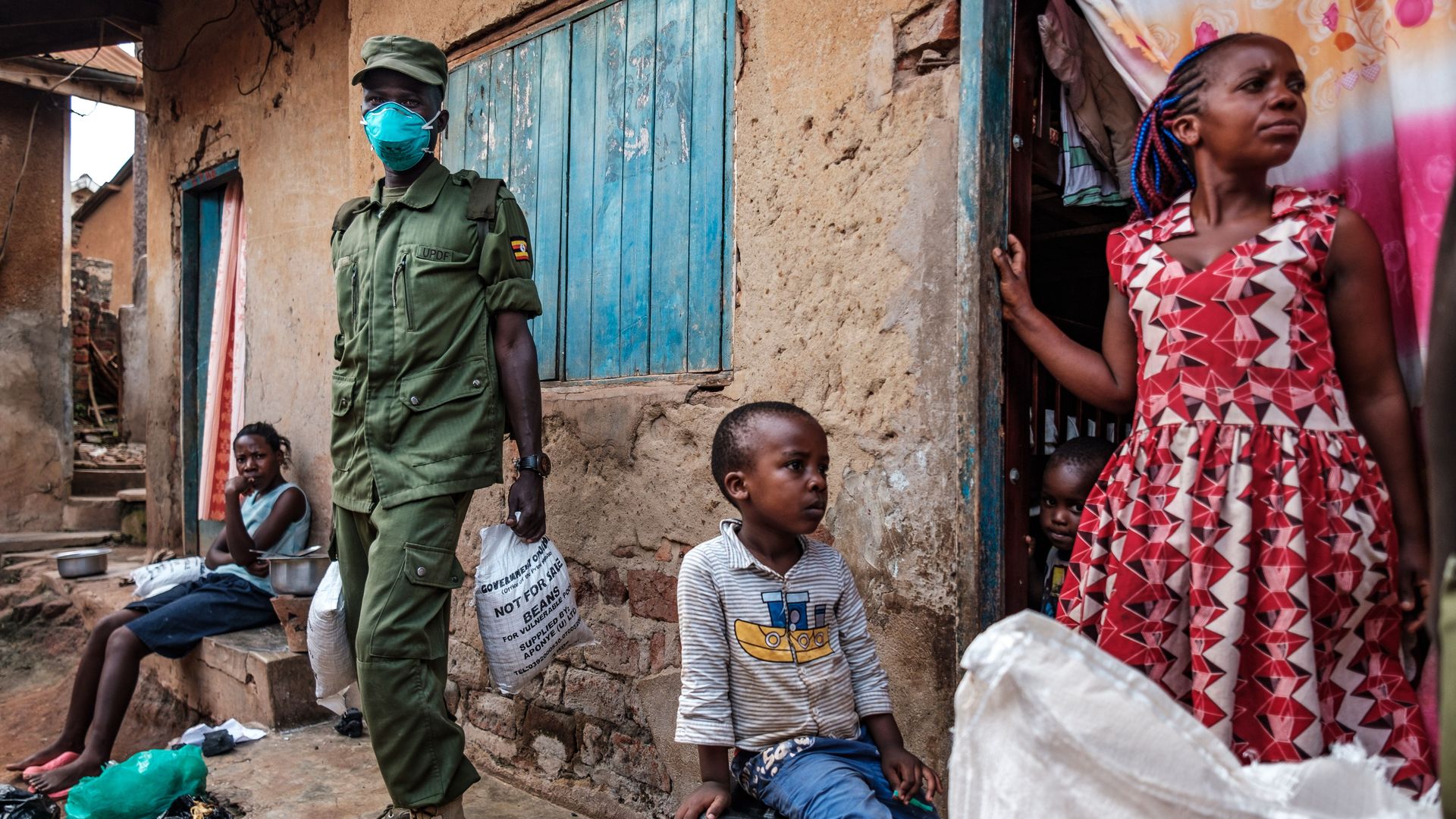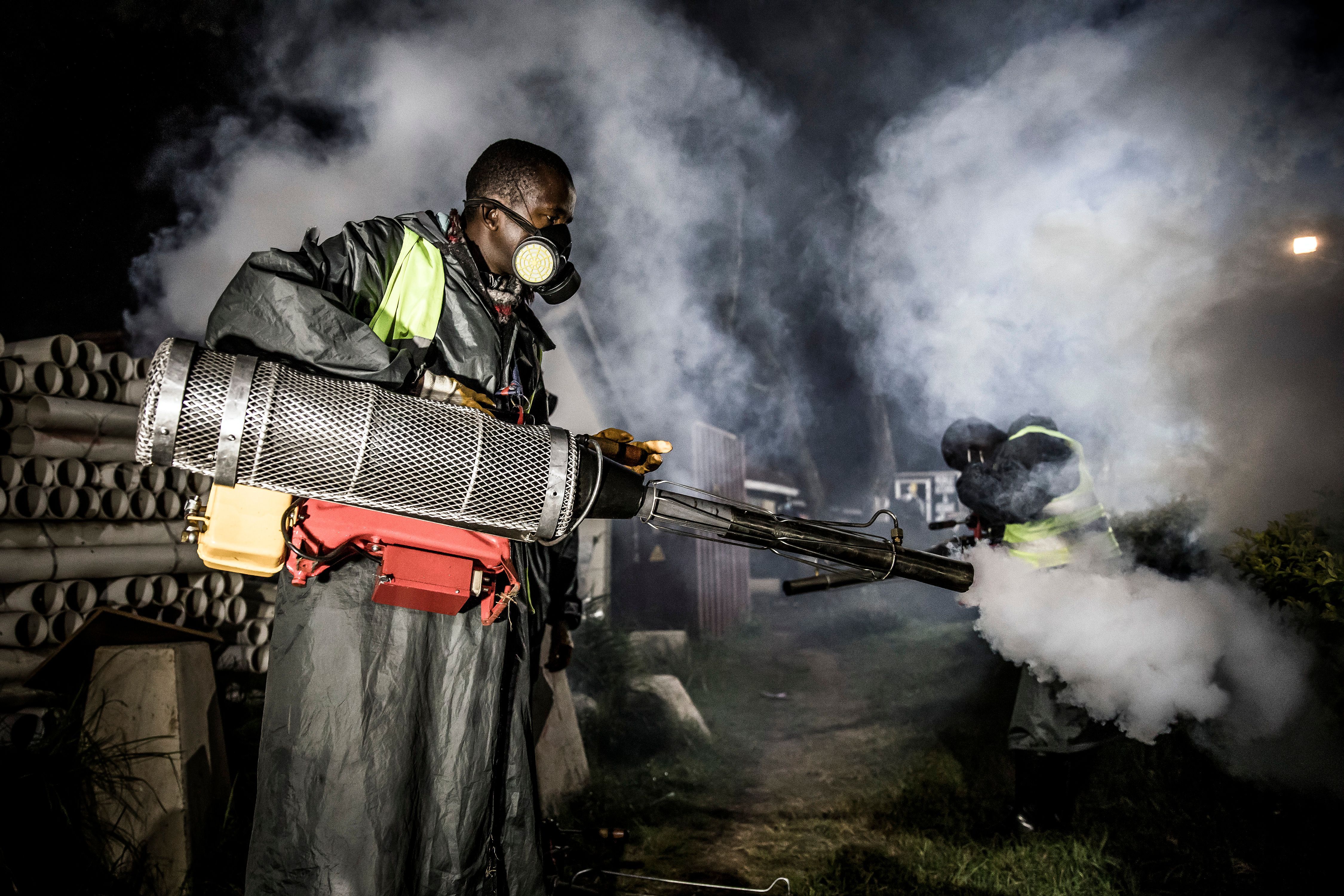Coronavirus accelerates in Africa as economic damage deepens
Add Axios as your preferred source to
see more of our stories on Google.

A lockdown delivery, in Uganda. Photo: Sumy Sadurni/AFP via Getty
Africa is reeling from the economic ravages of the coronavirus. Now the disease itself is accelerating across the continent.
Why it matters: “The question we’ve been asking is, ‘Is it that we will not see widespread outbreaks or that we haven’t seen them yet?’” says Tom Frieden, former CDC director.
- The outbreaks are now growing, the WHO warns, and COVID-19 is spreading from cities into rural areas where they will be even harder to track and treat.
By the numbers: Home to 17% of the global population, Africa accounts for just 3.5% of the global case count and 1.8% of deaths.
- But while Africa (pop. 1.3 billion) has roughly as many confirmed cases as the U.K. (pop. 67 million), limited testing means the numbers tell only part of the story.
- An American is 150x as likely to have been tested as a Nigerian. While South Africa is conducting several times as many tests as any other African country, its testing rate is still only one-fourth that of the U.S.
That’s not to say we have no idea what’s happening on the continent. Frieden says enough strategic testing is being done to ensure massive outbreaks aren’t going undetected.
- But based on the data we do have, he says, “it is likely that Africa is on the brink of a large outbreak.”
- Frieden points to high test positivity rates in countries like Sudan as a sign many cases are going undetected. However, he expects mortality rates to remain relatively low given Africa’s young population.
The big picture: Many people who are never infected by COVID-19 will nonetheless die as a result of the pandemic.
- Issa Makumbi of Uganda’s Health Ministry noted on a media call last week that more people died of untreated malaria than from Ebola during the 2014 outbreak in West Africa.
- Not only are health care visits for non-COVID conditions down, he says, Uganda has had to delay vaccinations for yellow fever.
- “If health care doesn’t continue to provide the essential gains that have been provided over the last decade, you could see as many as 10 times as many deaths from malaria, tuberculosis and other infectious disease causes as from COVID even in a large COVID outbreak," Frieden warns.

The outlook darkens further when you add in the frightening increases in food insecurity, says Gayle Smith, CEO of the ONE Campaign and a former USAID administrator. “The virus is the one thing we’re all tracking, but it’s these aftershocks."
Where things stand: Commodity prices (notably oil) were crushed as the world went into lockdown. Remittance flows dried up and tourism ceased — all before lockdowns froze African economies.
- Governments now need to do more, in terms of stimulus and health spending, with lower revenues. Their room to maneuver is severely limited by existing debts.
- Cash and debt relief are the most valuable contributions the international community can make right now, Smith says.
Help has been slow to arrive. “I'm sure it's in part because every country is dealing with it at home, but I've never seen a crisis like this to which there's been so little international response,” says Smith.
- “I mean, you look at Ebola, the Haiti earthquake, I worked on all the chronic humanitarian crises for years. And this is just not triggering the kind of response that these things usually do.”
- “We just watched this move around the entire planet. I fear that we’ve got this perception that if we can just manage it here, then we’re fine. And that’s not true for any country anywhere.”
The flipside: Africa stands out in terms of international cooperation during the pandemic — from health bodies like the African CDC to coordination between finance ministers to the creation of a new Africa Medical Supply Platform to distribute supplies around the continent.
- Lessons from AIDS and Ebola were put to good use. South Africa established testing centers in townships to catch outbreaks early.
- Contact tracing — often conducted door-to-door — ramped up more quickly in some African cities than American ones.
- Africa has experience to draw on, favorable demographics and it's had time to prepare.
The bottom line: As the pandemic shifts from the rich world to the developing one, countries will hope the advantages they do have will outweigh the resources they don't.
Go deeper:
